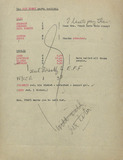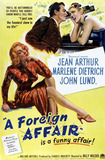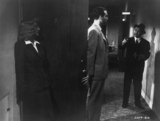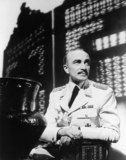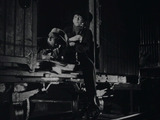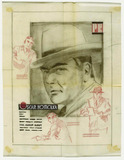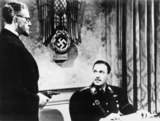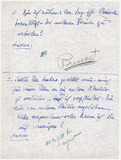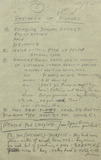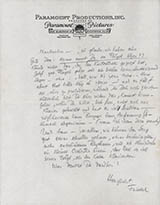Accounts of the Gin Rummy Benefit, 9 December 1940
The European Film Fund was established by a group of German emigrants in Hollywood’s film industry in 1938 to support destitute immigrant colleagues. The Fund did not have much money to distribute, and at the same time the number of people in need was growing.
Billy Wilder: A Foreign Affair (1948)
The director Billy Wilder had volunteered for the US Army in 1942, but had not been enlisted. Only after the end of the war in 1945 was he sent as a film envoy to war-ravaged Germany. With his knowledge of the local film scene, he was charged with reconstruction and denazification of the the German film industry.
Billy Wilder: Film noir Double Indemnity (1944)
This still photo from the film noir classic Double Indemnity (Ger. Frau ohne Gewissen, 1944) by Billy Wilder contains a logical error that the director had to accept due to the camera position.
Conrad Veidt as Major Strasser in Casablanca (1942)
The Ufa star Conrad Veidt, who had left Germany out of moral conviction, going first to the UK in 1940, then into exile in Hollywood, met the same fate as many of his fellow actors. As a committed anti-fascist he had to play the German villain in American anti-Nazi productions.
Detlef Sierck, Wilton's Zoo, (Spielfilm, NL 1939, Filmausschnitt)
Jan Grovers (Annie van Ees) along with his friend Pietje (Guus Brox) commit all kinds of scams in the streets of Rotterdam. A priest tries to take the boys from poor backgrounds under his wing and show them the right path.
Draft advertisement for Oskar Homolka
Of the numerous émigré actors who were represented by agent Paul Kohner in Hollywood, Oskar Homolka was among the more successful ones.
Ernst Lubitsch: To Be Or Not To Be (1942)
Two years after Charlie Chaplin’s very successful satire The Great Dictator (first German showing 1958), the famous director Ernst Lubitsch filmed his intelligent comedy To Be Or Not To Be in 1942 (first German showing 1960).
Felix Bressart: List of questions to his agent Paul Kohner (9 January 1940)
Actor Felix Bressart, resident in the USA since 1938 and a client of the Paul Kohner Agency, had drawn the winning ticket: a six-year contract with Metro-Goldwyn-Mayer (MGM) which now awaited his signature.
Frederick Kohner: Draft screenplay Burning Secret (1938)
The melancholy of farewells was the underlying tone of Brennendes Geheimnis in 1933, a film version of Stefan Zweig’s novella of the same name. Frederick Kohner had written the script and the film was directed by director Robert Siodmak.
Friedrich Hollaender: Letter to Marlene Dietrich (undated)
The first collaboration between Friedrich Hollaender and Marlene Dietrich had already shown what a good team the two made: The Blue Angel (Der Blaue Engel - 1930), was an international success for both the actress and the composer. Dietrich subsequently moved to Hollywood, Hollaender became a busy film composer.
